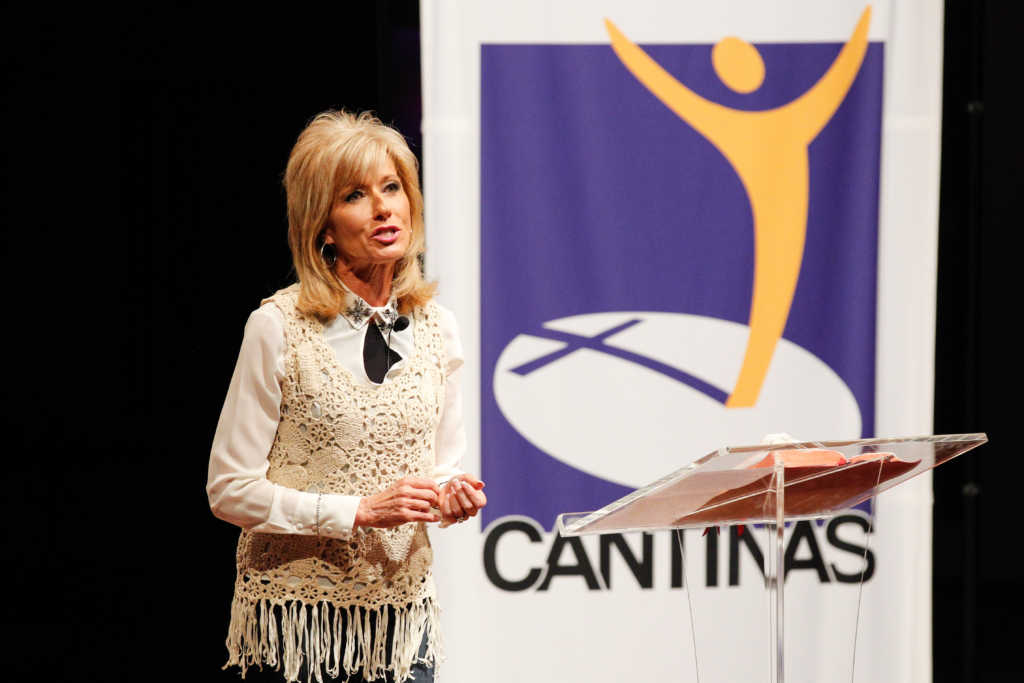California pastor John MacArthur doubled down Sunday, several weeks after he criticized well-known Christian author and speaker Beth Moore.
In mid-October, MacArthur, while speaking at a celebration of his 50-year preaching career, was asked by moderator Todd Friel, also a pastor, to respond to the name “Beth Moore.” The 80-year-old minister obliged, offering a two-word response to Friel, “Go home.” The cavalier reaction sent shockwaves through the evangelical community, leading some to come to MacArthur’s defense while others criticized the seasoned pastor for the tone of his rhetoric.
After the audience’s laughter subsided, MacArthur said there’s “no case that can be made biblically for a woman preacher.” Moore, it should be noted, does not refer to herself as a pastor, as she has said she subscribes to the theological belief that the role of pastor is reserved for men. She responded at the time via Twitter, writing she did not “surrender to a calling of man” when she dedicated her life to ministry at the age of 18. Moore said she “will follow Jesus — and Jesus alone — all the way home.”
The dustup between the two prominent Christian leaders subsided in the days that followed, but over the weekend, MacArthur raised the issue once again in a sermon posted to his YouTube channel titled, “Does the Bible Permit a Woman to Preach?”
At the outset of his message, MacArthur directly linked the inspiration for the topic of his sermon to Moore — whom he later referred to as “that woman” — and the attention his comments last month attracted.
“Today, I want to address a very important issue that has been stirred up on the internet with me kind of in the middle of it,” he told the congregation Sunday. “I do not like to give short answers. I don’t like to get put in a position to do that, because I feel like that just escalates confusion, so I want to take the opportunity to address the issue of women preachers this morning and to give you a more thorough answer from the Word of God on this very, very important subject.”
MacArthur’s view that women should not be in pastoral leadership is far from unique in evangelical Christianity. According to the Baptist Faith and Message, which summarizes Southern Baptist thought on critical matters of the day, “the office of pastor is limited to men as qualified by Scripture.”
The criticism that has come MacArthur’s way has had less to do with his theological conviction on the roles women can hold within the church. Rather, the critiques he has faced have largely centered on the way he has communicated his perspective.
After speaking briefly on Isaiah 3, in which the Lord promised judgment on the women of Judah who had become self-centered and taken their focus away from God and set their affections toward worldly approval and attention by adorning themselves with lavish jewelry, MacArthur suggested that when women take up places of authority in society, it leaves men weakened.
“When women take over a culture, men become weak; when men become weak, they can be conquered,” he said. “[W]hen all the men have been slaughtered, you [women] can sit there with all your jewelry and junk. You’ve been conquered, because you overpowered your protector.”
Later in the sermon, he argued women are not suited for spiritual — or even cultural — authority and leadership because of their “typical women’s sensibilities,” which he outlined as “compassion,” “mercy,” and “kindness.” Because of these “sensibilities,” he explained, women are “more vulnerable,” and as such, are not suited to hold places of authority and are instead in need of fathers and husbands who can “protect them from deception.”
Soon, the sermon, which was motivated by the reaction he received from his comments about Moore, stretched past the female writer and ventured into his theological views about women in all spheres of leadership, including politically and culturally in America.
“Let me tell you something, if children are in charge, we’re in trouble. If women are in charge, we’re in trouble,” MacArthur said about halfway through the hour-long message. “And if you look carefully at our nation, you would have to agree that it’s childish, young, inexperienced, ignorant women who are ascending into power. When you overthrow the divine order, the results are always disastrous. And again, it’s not anti-women any more than it’s anti-children. But it’s a divine judgment on a nation that its young and its women are in power.”
Moore, who last year penned an open letter to her “brothers in Christ,” calling attention to the “misogyny, objectification and astonishing disesteem of women” in some areas of evangelical society, offered a brief reaction Tuesday to MacArthur’s sermon.
“These are the weirdest days,” tweeted Moore. “I don’t know why it’s not just easier to say we went too far than to just keep doubling down. That’s the trouble with jobs and positions being dependent on extremism. You feel stuck. Jesus, help us. We’ve gotten ourselves backed into corners.”
And in a follow-up tweet to the author of this article, Moore wrote the “one good thing” about the attention MacArthur’s rhetoric has received “is that it is clarifying.”
“I’ll leave it at that,” she added.



